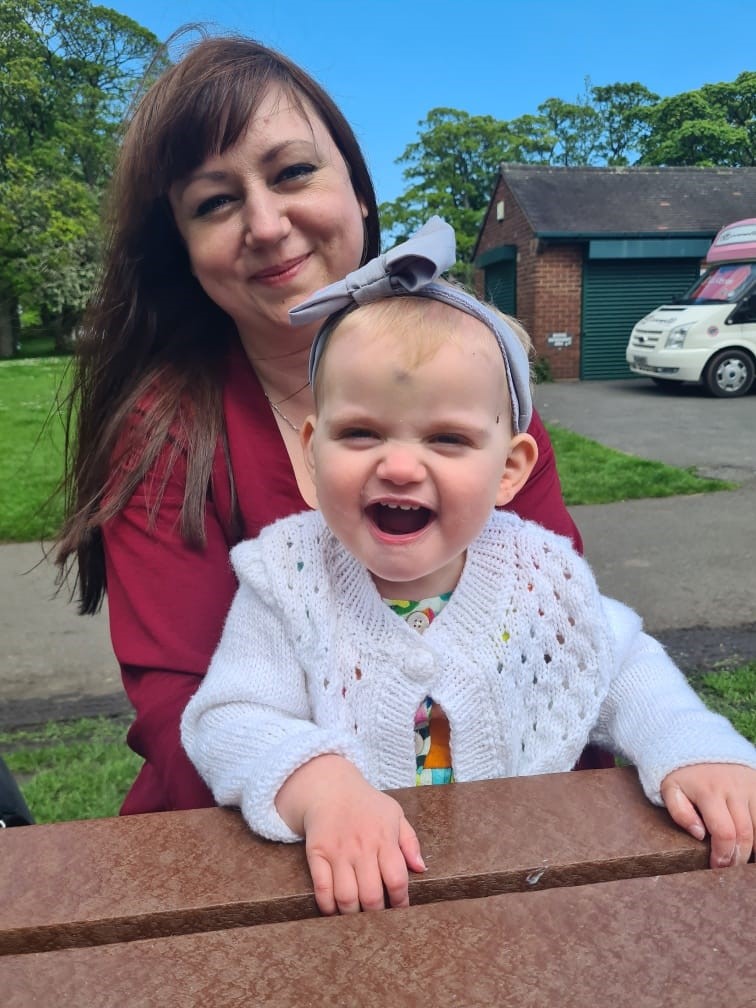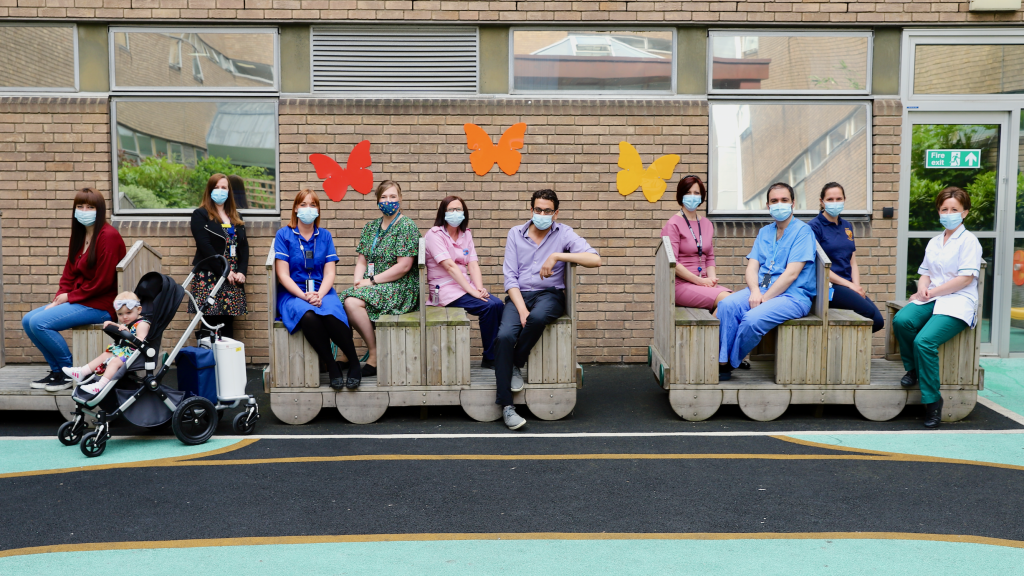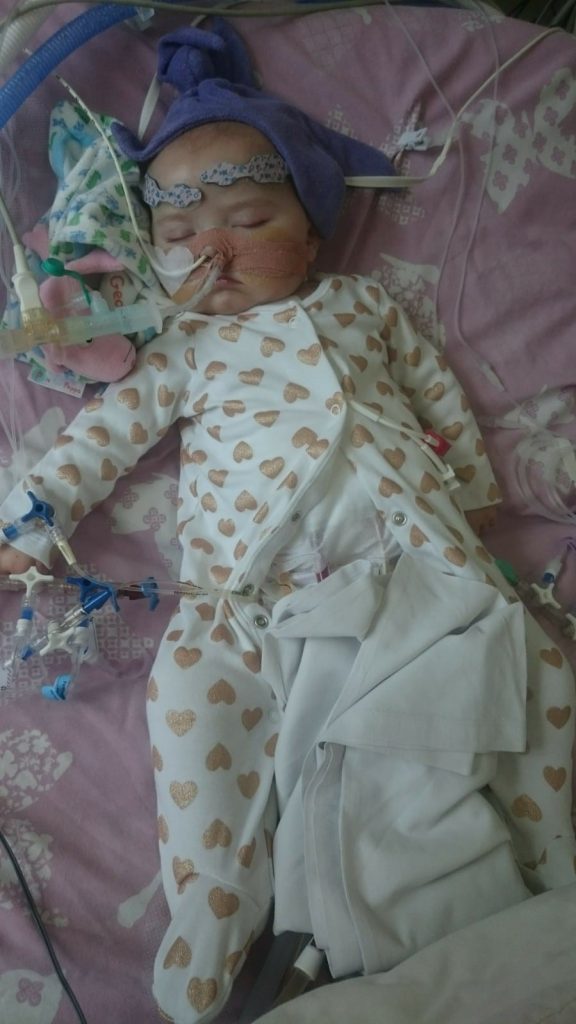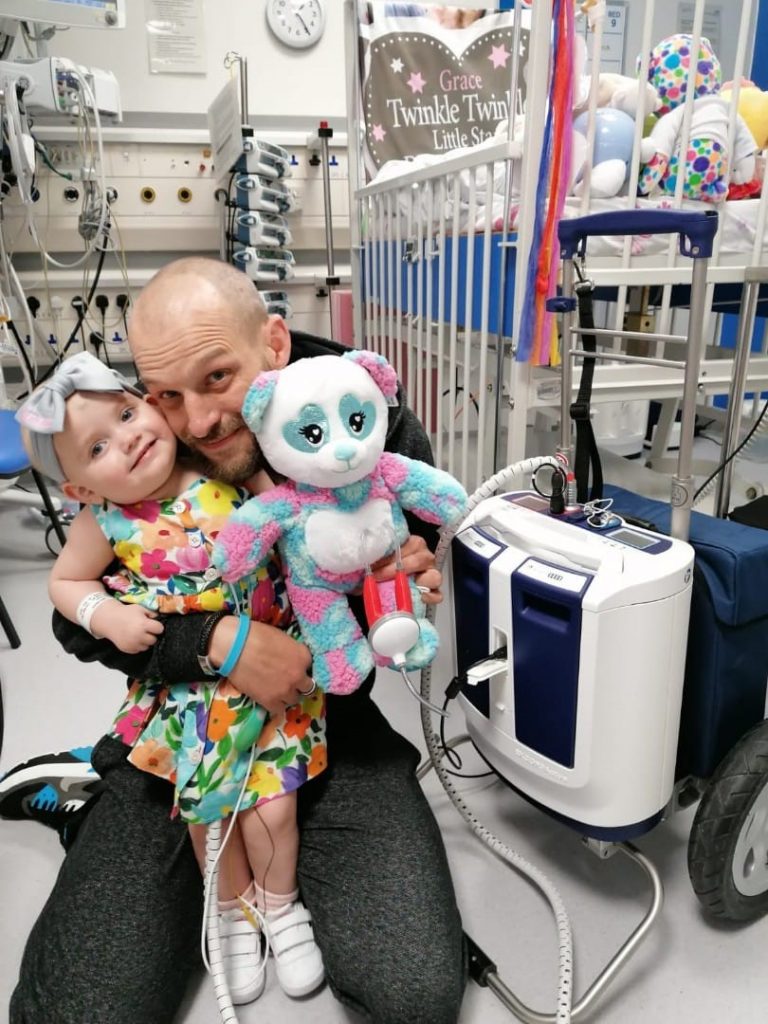LITTLE Grace Westwood has become the first child in the UK to have a mobile Berlin Heart driving unit (the Berlin Heart Excor ACTIVE™ï¸) – at the age of just 18 months.
In May, doctors at Newcastle Hospitals fitted the portable driving unit which operates the pump assisting blood flow to the heart.
Previously the Berlin heart pump (Berlin Heart™ï¸) was powered by a large heavy machine with a battery life of 20 to 30 minutes unplugged, meaning the vast majority of patient time had to be spent on the ward.
Grace’s new driving unit is fully portable, with a battery life of up to eight hours, which means mum and dad can attach it to a pushchair and do something most families take for granted – take their beloved daughter out for a walk.

The machine, which looks like a small suitcase, rests on two wheels with a handle for it to follow easily in tow, and comes with extra battery packs.
The development and launch of the mobile driving unit involved an international collaboration between RWTH Aachen University, Uniklinik RWTH Aachen, Newcastle Hospitals, Newcastle University, and Berlin Heart GmbH.
Last year their project ‘Mobile Autonomy for Children in End-stage Heart Failure” (MACH) won the 2020 Horizon Impact Award which celebrates outstanding EU funded projects that have used their results to provide value for society across Europe and beyond.
Consultant in paediatric cardiovascular intensive care medicine, Dr Emma Simpson, said: “Newcastle was pivotal in bringing this to market and our patients and families were also given a voice throughout the project which influenced the manufacture and design of this device.
“Our goal was to reduce the stress and impact of a long-term hospitalisation on the children and their families by offering them mobility and autonomy in their daily lives in the hospital environment.
“We’ve also developed a learning platform which benefits the family as well as the child waiting for a donor heart – this platform helps their child not just to survive but to live a full a life as possible.
“This has been an amazing collaborative effort involving some of the world’s experts in the care of children with VAD and a highly professional team at the Freeman.”

This pioneering treatment is the latest phase of a remarkable – but difficult – journey for Grace and her family which began when she was born in November 2019 and has continued throughout the coronavirus pandemic.
Currently, home to Grace is ward 23 at the Freeman Hospital where she is currently on the urgent waiting list for a heart transplant while parents Darren and Becci have uprooted their lives from Birmingham to spend as much time as possible with her.
“It turned out that Grace was born with an impairment of the left ventricle but for a week it was a mystery what was wrong with her,” said dad Darren.
“She was so poorly and it wasn’t until we went into Birmingham Children’s Hospital we found out she had a heart condition.”
In the following months, Grace was diagnosed with dilated cardiomyopathy and was given medication and her condition was closely monitored. However in March 2020, she took a turn for the worse and was rushed to Accident and Emergency.
“She was in a really bad way and had up to eight cardiac arrests in one day,” added Darren.
“Her body was starting to shut down and she was put on dialysis for her kidneys. We were told to fear the worst but then she went back to being stable again although had to remain in paediatric intensive care. She then had further complications and the conversation had moved towards Grace needing a heart transplant at the Freeman.”
With the country in lockdown, Grace was airlifted to the Freeman Hospital in May but pandemic restrictions meant her parents couldn’t go with her and instead had to endure an anxious car ride to Newcastle from Birmingham.
The following day, she had an eight-hour operation to have a Berlin heart Ventricular Assist Device (VAD) implanted – an air driven pump which takes over the function of a child’s own heart – which will remain in place until a heart transplant is possible.

Grace has currently spent the longest time on Berlin Heart since the Freeman first started using this technology in 2005.
Mum Becci, who has not left Newcastle since Grace’s journey north, explained: “That was the longest drive of our lives – not knowing if she was going to make it through the flight and she was so poorly – but thanks to the Berlin Heart she survived and has come on leaps and bounds.
“She’s leading as normal a life as she can and is amazing in herself. She loves everything and everyone and, while we’ve got to be careful with her, she’s trying to walk, she’s chatty and smiling all the time.”
However, the pandemic has been an added complication for the family as, up until very recently, only one parent was able to visit Grace at any time, plus she has an older five-year-old brother, Josh, who has had to spend a lot of time in a support bubble with his grandparents.
It’s also been costly for the family as while mum has stayed at Scott House on the hospital grounds, any visits from Josh or extended family have meant the additional expense of hotel accommodation.
Now, the mobile driving unit has been fitted, they are optimistic about spending more time together outside and have ventured to the park opposite the hospital.
Darren said: “This is going to make a huge difference to us. We can take her to the playroom and we don’t have to cut our time short. It’s the little things she’s missed out on – touching the grass, listening to the birds sing, seeing family properly instead of through a window and that’s what we’re looking forward to – although we still have to be careful.
“We would also like to add how amazing all the staff have been, and to the charities that have helped us through this tough time so far.”

The family are also acutely aware that for Grace to get a new heart, a family somewhere have to go through their own personal tragedy and then make the decision for their child to become a donor.
“If that day comes, it’s a pure selfless act to save others through their traffic loss and that we would be forever grateful for,” said Becci.
“You never imagine your own family could be in this position but anything we can do to raise awareness of organ donation is so important.”
